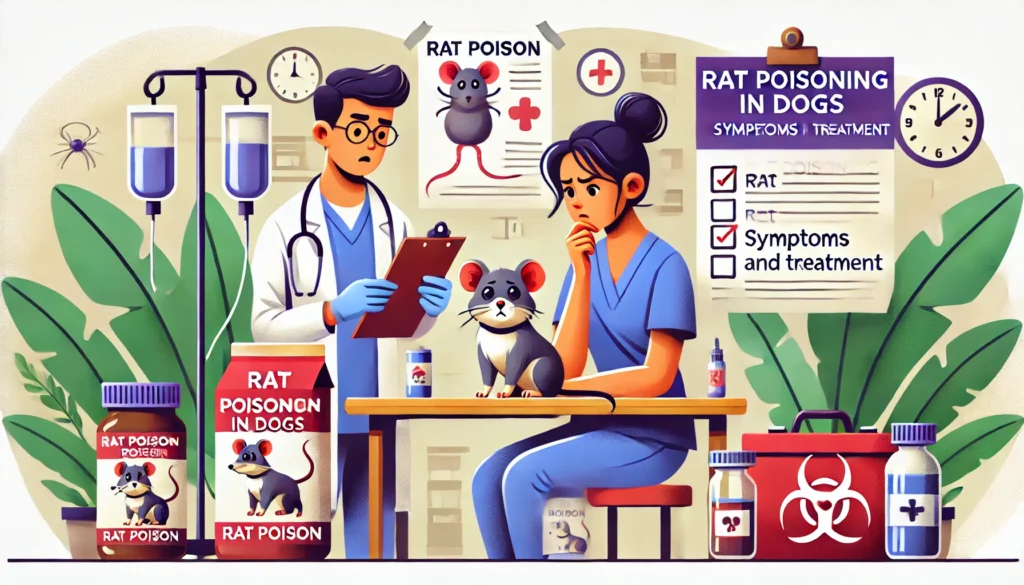Rat Poisoning in Dogs

A Comprehensive Guide
Rat Poisoning in Dogs is a severe veterinary emergency that requires immediate attention. When a dog ingests rat poison, such as products from brands like Tomcat, the consequences can be fatal without prompt and effective intervention. This guide explores the risks associated with rat poison, common symptoms of poisoning, and the crucial steps to take if a dog has been poisoned, including understanding the implications of different types of rat poison like anticoagulant rodenticides, cholecalciferol, and bromethalin.
Understanding Rat Poison
Rat poison, or rodenticide, is designed to kill rodents by employing various toxic substances. Unfortunately, these poisons are also highly attractive and deadly to dogs. Common types of rat poison include:
1. Anticoagulant Rodenticides
These are the most common types found in households, inhibiting the body’s ability to utilize vitamin K, necessary for blood clotting, resulting in uncontrollable bleeding. Products may contain brodifacoum, bromadiolone, or diphacinone.

2. Cholecalciferol (Vitamin D3)
This type increases blood calcium levels, leading to kidney failure and other severe health issues. It’s highly potent and dangerous, carrying a higher risk of fatality.
3. Bromethalin
A neurotoxin affecting the brain and liver, causing swelling within the brain, which leads to neurological symptoms and potentially irreversible damage.
do you know
As pet owners, our dogs are more than just animals; they are family members. The thought of losing them is heartbreaking, but understanding the signs that a dog is nearing the end can help us prepare to provide the necessary comfort and care during their final days.
Symptoms of Rat Poisoning in Dogs
The symptoms of Rat Poisoning in Dogs vary depending on the type of poison ingested and can appear within hours or take days to manifest. Recognizing these signs can be the difference between life and death:
Anticoagulant Symptoms:
- Weakness or lethargy
- Difficulty breathing or coughing (potentially with blood)
- Bloody feces or urine
- Severe bleeding from gums or nose
- Sudden collapse
Cholecalciferol Symptoms:
- Vomiting and diarrhea
- Weakness and unusual quietness
- Increased thirst and urination
- Abdominal pain
- Seizures
Bromethalin Symptoms:
- Severe, progressive neurological signs
- Tremors and seizures
- Loss of coordination
- Paralysis
- Coma
Immediate Actions to Take
If you suspect that Rat Poisoning in Dogs:
- Do not wait for symptoms to develop.
- Contact your veterinarian or an emergency vet clinic immediately.
- Follow their advice, which may include inducing vomiting. Never induce vomiting without professional guidance.
- Bring the packaging of the poison, or any remains of what your dog ingested, to the vet for identification.
Treatment Options
Treatment varies based on the type of poison ingested:
- Anticoagulant: Treatment typically involves administration of Vitamin K1 for several weeks, along with blood transfusions if necessary.
- Cholecalciferol: Involves aggressive fluid therapy, medications to lower calcium levels, and other supportive measures.
- Bromethalin: There is no antidote; treatment focuses on supportive care to reduce symptoms, such as medications to control swelling in the brain and seizures.
Preventing Rat Poisoning in Dogs
Prevention is key to avoiding the dangers of Rat Poisoning in Dogs:
- Use safer rodent control methods such as live traps or electronic devices that are less harmful to pets.
- Store all poisons securely out of reach of pets and children.
- Monitor your dog’s environment to ensure no exposure to these dangerous chemicals.
Conclusion
Rat Poisoning in Dogs is a serious and often preventable issue. By understanding the types of rat poison, recognizing the symptoms, knowing what immediate actions to take, and being aware of treatment options, you can save your pet’s life. Always act swiftly if you suspect your dog has ingested poison and strive to create a safe environment that minimizes these risks.
Can a dog get poisoned from eating a rat?
Yes, if the rat was poisoned. Secondary poisoning can occur if the dog consumes enough of the toxic substance that the rat had ingested.
How do you flush poison out of a dog’s system?
Immediate veterinary care is crucial. Vets may use activated charcoal to absorb toxins or induce vomiting, and provide IV fluids to help flush the system.
Can Rat Poisoning in Dogs cause kidney failure?
Yes, particularly poisons containing cholecalciferol (Vitamin D3), which can drastically increase calcium levels, leading to kidney failure.
Can dogs get sick from biting a rat?
Yes, dogs can get sick from biting a rat as they can contract diseases like leptospirosis or rat-bite fever from the rodent.
How to cure poisoned dog at home?
Do not attempt to treat a poisoned dog at home. Immediate veterinary intervention is essential for the best outcome.
What neutralizes rat poison in dogs?
There is no universal neutralizer. Treatment depends on the type of poison ingested and must be administered by a veterinarian.
Can a dog survive rat poisoning without treatment?
Survival without treatment is unlikely, especially with severe poisons that cause internal bleeding or organ failure.
How does rat urine affect dogs?
Rat urine can transmit diseases like leptospirosis to dogs, which can lead to severe health issues, including liver or kidney damage.
What if my dog has rat poison in his mouth but didn’t eat it?
Wash your dog’s mouth thoroughly and observe for any symptoms. Consult a vet even if no symptoms appear immediately.
What happens if my dog kills a rat?
Monitor your dog for signs of illness or distress, as rats can carry diseases. Consult a vet if you suspect your dog has ingested any part of the rat or the rat was poisoned.

